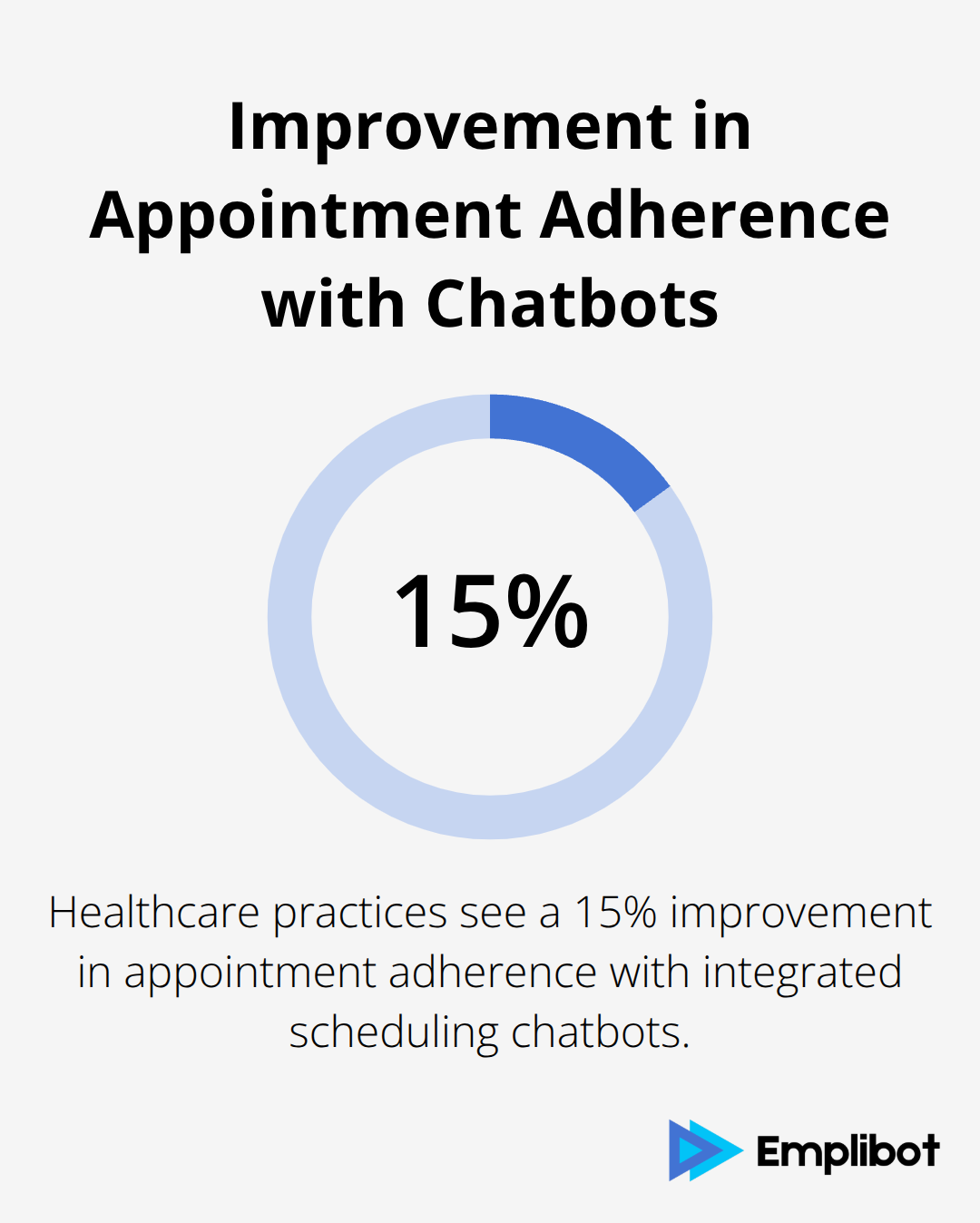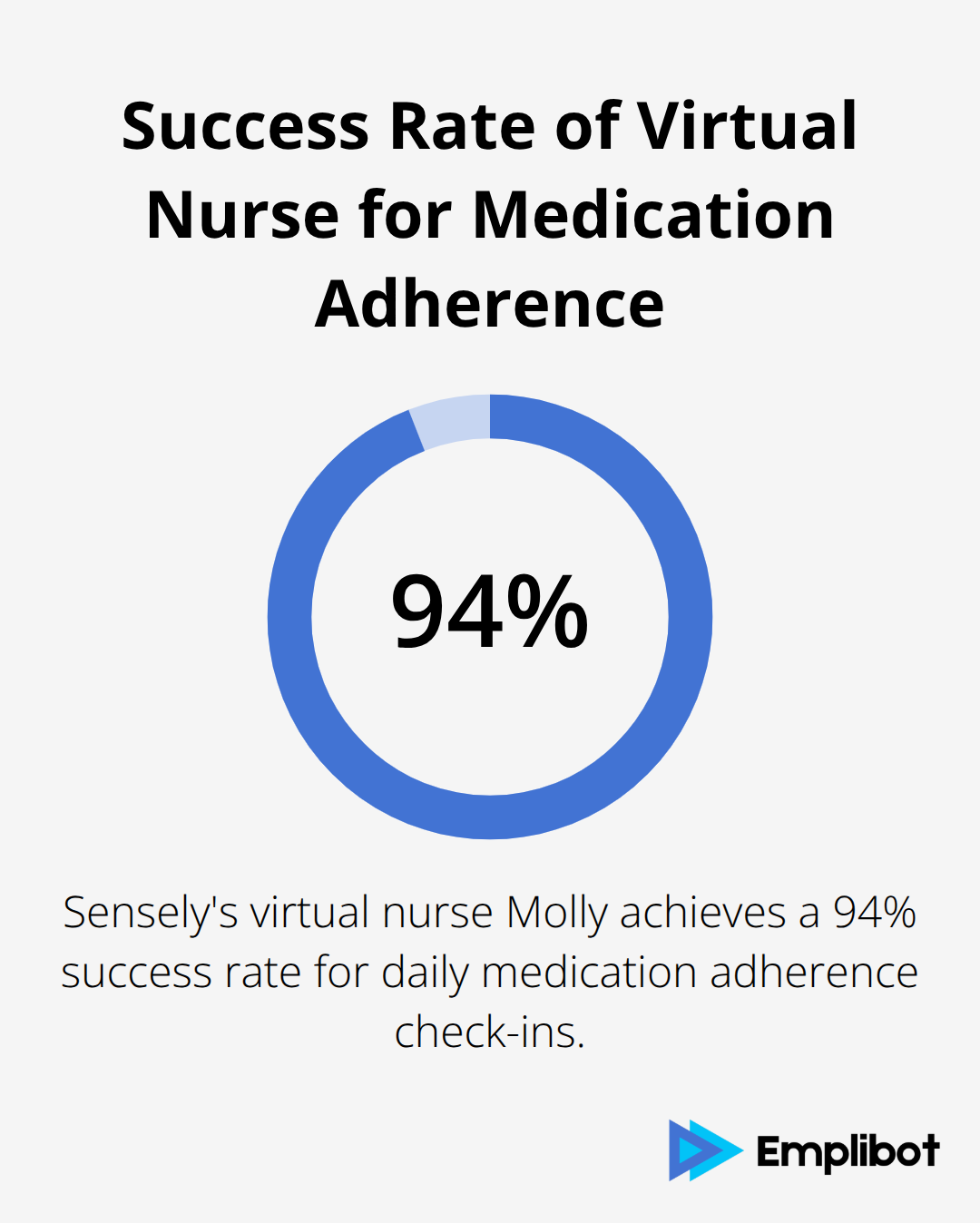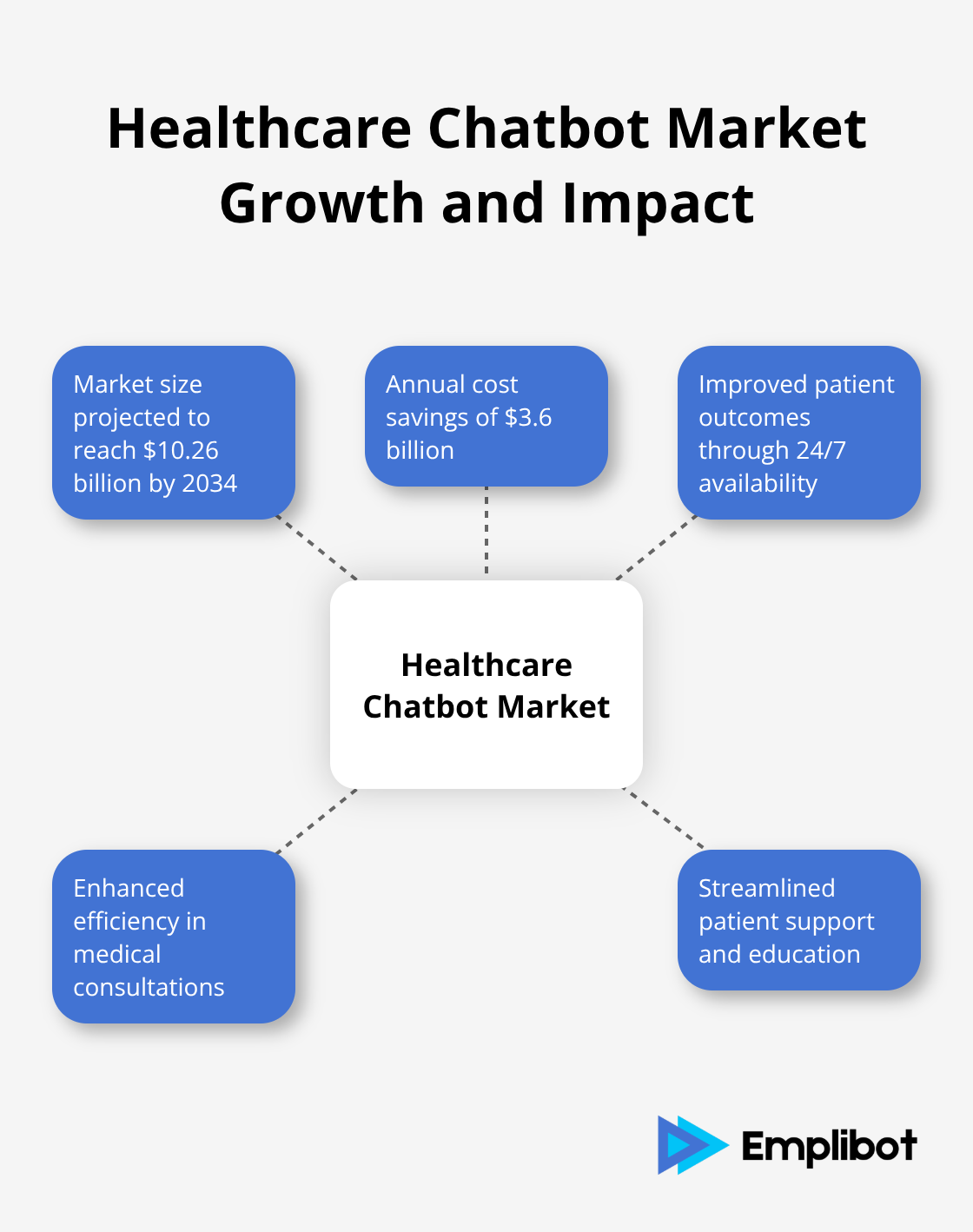Healthcare chatbots are transforming patient care by handling routine tasks and providing 24/7 support. These AI-powered tools now manage everything from symptom assessment to appointment scheduling.
We at Emplibot see growing adoption across medical facilities worldwide. The most effective chatbot use cases in healthcare focus on three key areas: medical consultation, patient support, and administrative efficiency.
How Do Chatbots Handle Medical Consultations?
Medical consultation chatbots revolutionize patient care through instant symptom assessment and intelligent triage. Ada Health achieved the best results in diagnostic accuracy during clinical studies, which proves that AI can match human diagnostic capabilities in specific scenarios. These systems process patient symptoms through Natural Language Processing and guide users toward appropriate care levels based on severity indicators.
Symptom Assessment That Actually Works
Effective symptom checkers ask targeted questions rather than generic health inquiries. The MSD LungX chatbot identifies lung cancer risks through specific health questions, which demonstrates how focused algorithms outperform broad diagnostic tools. Successful implementations require integration with clinical decision trees and evidence-based protocols. Healthcare facilities that use symptom assessment chatbots report improved patient satisfaction scores among users who receive appropriate care routing.
Smart Appointment Management Systems
Modern appointment chatbots go beyond basic scheduling to include doctor availability verification and patient routing. UCHealth’s Livi chatbot helps patients find test results while it offers personalized scheduling based on medical history and urgency levels. These systems reduce no-show rates significantly when combined with automated reminder functions (particularly effective for elderly patients). Healthcare practices with integrated scheduling chatbots see 15% improvement in appointment adherence and reduced administrative workload for staff members.

Emergency Triage and Response Protocols
Emergency response chatbots must follow strict protocols to avoid mishandling critical situations. Effective systems immediately escalate high-risk symptoms to human operators while they provide clear instructions for urgent care access. The key lies in conservative programming that errs on caution rather than convenience. Facilities that implement emergency triage chatbots report faster response times for genuine emergencies and better resource allocation during peak periods (especially during high-demand hours).
These medical consultation capabilities form just one pillar of comprehensive healthcare chatbot implementation. Patient support and education represent equally important applications that extend care beyond the initial consultation phase.
How Do Chatbots Support Ongoing Patient Care?
Patient support chatbots maintain continuous engagement beyond initial consultations. Florence chatbot serves as a digital nurse that reminds patients to take medications on schedule, which addresses the critical problem of medication non-adherence that costs the US healthcare system $100 billion annually. These systems track prescription schedules, monitor side effects, and alert healthcare providers when patients miss doses consistently. Sensely’s virtual nurse Molly achieves a 94% success rate for daily medication adherence check-ins, which demonstrates how consistent digital engagement improves treatment outcomes significantly.

Medication Management That Prevents Problems
Advanced medication chatbots integrate with pharmacy systems to track prescription refills and identify potential drug interactions before they become dangerous. The most effective implementations send personalized reminders based on individual patient schedules rather than generic alerts. Healthcare facilities report 30% improvement in medication adherence rates when patients use chatbots with customized reminder systems. Smart medication tracking also identifies patterns of missed doses that indicate deeper compliance issues (which allows providers to intervene before treatment failures occur).
Educational Resources That Change Behavior
Educational chatbots must deliver targeted information rather than generic health advice to drive meaningful behavior change. Woebot provides cognitive behavioral therapy techniques and achieves a 24% reduction in overall work impairment among users through focused mental health education. The Journal of Medical Systems research shows that chatbots promote behavior change when they track specific health metrics like anxiety levels and provide immediate feedback. Successful educational implementations focus on single health topics rather than broad wellness advice.
Recovery Monitoring That Prevents Complications
Post-treatment follow-up chatbots identify recovery complications early through systematic symptom monitoring and patient-reported outcomes. These systems schedule automatic check-ins at critical recovery milestones and escalate concerning symptoms to clinical staff immediately. Healthcare organizations that use structured follow-up chatbots see 25% reduction in readmission rates and improved patient satisfaction scores during recovery periods (particularly during the first 30 days after discharge). The most effective recovery chatbots integrate with electronic health records to provide clinicians with real-time recovery data rather than wait for scheduled appointments.
Patient support represents just one dimension of comprehensive chatbot implementation. Administrative tasks present equally significant opportunities for automation and efficiency improvements across healthcare operations.
How Do Chatbots Handle Healthcare Administration?
Administrative chatbots transform healthcare operations through automated insurance verification, patient registration, and billing support. Zoho’s HIPAA-compliant platform demonstrates how secure automation reduces administrative costs while it maintains data protection standards that healthcare environments require. Insurance verification chatbots connect directly with payer databases to confirm coverage eligibility in real-time, which eliminates the manual phone calls that consume significant time per patient verification. Healthcare facilities that implement automated insurance checks can speed up eligibility checks and ensure patient insurance and billing information is accurate during peak registration periods.
Insurance Verification That Prevents Claim Denials
Modern insurance verification systems access multiple payer databases simultaneously to confirm patient coverage details before appointments begin. These chatbots validate policy numbers, check deductible amounts, and identify pre-authorization requirements for specific procedures automatically. Healthcare practices see immediate benefits when chatbots handle verification tasks that previously required dedicated staff members to spend hours on hold with insurance companies. The most effective systems flag potential coverage issues early and alert staff to collect additional information before services occur (which prevents costly claim rejections later).
Patient Registration That Speeds Check-In
Patient registration chatbots collect essential information before appointments while they validate insurance details and medical history accuracy. These systems integrate with electronic health records to pre-populate patient profiles and identify documentation requirements automatically. The most effective implementations use conditional logic to ask relevant questions based on appointment types rather than generic intake forms. Chatbots systematically collect data through specific queries and data retrieval, improving patient engagement and quality of life when patients complete registration before arrival, which reduces wait room congestion and improves staff efficiency significantly.
Billing Support That Accelerates Collections
Billing inquiry chatbots handle payment questions, explain charges, and process payment arrangements without human intervention. These systems access patient accounts to provide real-time balance information and payment history while they offer multiple payment options through secure portals. Healthcare organizations that deploy billing chatbots report improved payment collection rates and reduced call volume to billing departments. The most successful implementations integrate with existing practice management systems to provide accurate account information and automate payment plan setup for patients who need financial assistance options.
Final Thoughts
Healthcare chatbots deliver measurable benefits across medical consultation, patient support, and administrative operations. The global healthcare chatbot market will reach $10.26 billion by 2034, driven by proven cost savings of $3.6 billion annually and improved patient outcomes through 24/7 availability. These chatbot use cases in healthcare demonstrate clear value when organizations focus on specific functions rather than broad applications.
Successful implementation requires careful consideration of data privacy compliance, integration with existing electronic health records, and staff training protocols. Healthcare organizations must prioritize HIPAA-compliant platforms and establish clear escalation procedures for complex cases that require human intervention. Symptom assessment chatbots achieve 99% accuracy when designed for targeted conditions, while medication adherence systems improve compliance rates by 30% through personalized reminder protocols.
Future developments will expand diagnostic capabilities and real-time health monitoring integration with wearable devices (particularly for chronic disease management). Machine learning advances will enhance decision-making accuracy and enable more sophisticated patient interactions across all healthcare touchpoints. Healthcare organizations seeking comprehensive digital transformation can benefit from automated content marketing solutions that support their broader communication strategies while implementing chatbot technologies for direct patient care.


